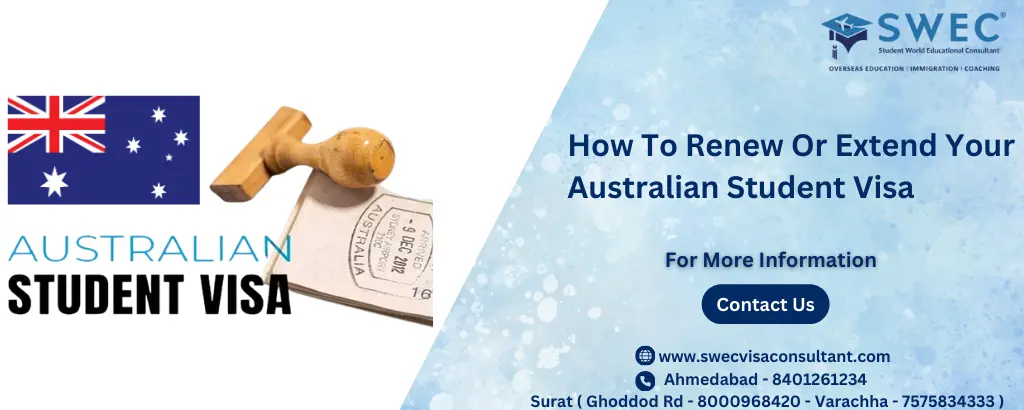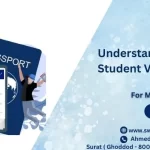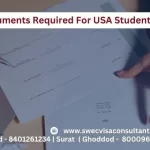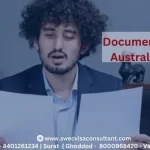The Australian Student Visa (Subclass 500) allows international students to study in Australia for up to five years, depending on their chosen course. It is designed to enable students to pursue full-time study at a registered educational institution in Australia. However, during their academic journey, many students find that they need to extend or renew their visas due to various reasons.
It is vital to renew or extend your Australian student visa before it expires. Staying in Australia without a valid passport is illegal and can lead to severe consequences, including deportation and a ban on re-entering the country. Additionally, failing to renew your visa on time may affect your ability to complete your studies or pursue further education in Australia.
In this blog, we will guide you step-by-step on how to renew or extend your Australian student visa. We’ll explain the reasons for extending your visa, the required documents, timelines, and essential tips to ensure a smooth renewal process. This guide is particularly relevant for those facing delays in their studies, enrolling in a new course, or approaching their visa expiration date.
Table of Contents
Reasons for Renewing or Extending a Student Visa
There are several common reasons why international students may need to renew or extend their student visas in Australia. Below, we’ll explore these situations in detail.
Extended Study Period
The course duration may sometimes extend beyond the initial visa period due to various factors. These could include a shift in course structure, needing extra time for thesis work, or repeating certain subjects. In such cases, applying for a visa extension is essential to complete your studies legally.
Enrolling in a New Course
Suppose you’re transitioning from one course to another, such as moving from an undergraduate degree to a postgraduate program or enrolling in a completely new field of study. In that case, you will need to renew your visa. This ensures that your new course duration aligns with your visa’s validity.
Delays in Course Completion
Unexpected events such as academic challenges, personal issues, or even delays from your educational institution can impact your course completion timeline. This might extend your study period, making a visa extension necessary.
Additional Studies
Some students may decide to take additional studies such as bridging programs, diploma courses, or certifications to enhance their skills. Any additional study period requires a valid student visa, and hence, you must apply for a renewal.
Visa Expiration Nearing
If your visa is about to expire, but you have yet to finish your studies or are waiting for graduation, it is crucial to apply for an extension well in advance. The Department of Home Affairs advises students to begin the renewal process at least 3 to 4 months before the visa expiry date to avoid last-minute issues.
When to Start the Renewal or Extension Process
Ideal Timeframe to Apply
It is strongly recommended that students start the visa renewal or extension process at least 3-4 months before their current visa expires. This ensures that you have ample time to gather all necessary documents and avoid any last-minute complications. Applying early also gives you time to deal with unforeseen issues, such as delayed paperwork from your educational institution or changes in personal circumstances.
Consequences of Late Application
Delaying your visa renewal can have severe consequences. If your visa expires before you apply for a new one, you risk becoming unlawful in Australia. This can lead to deportation and affect your ability to reapply for a visa in the future. Late applications may also result in gaps between your visa expiration and the issuance of a new visa, leaving you with an uncertain legal status.
Bridging Visa (BVA)
If your student visa expires while your new application is still being processed, you may be granted a Bridging Visa A (BVA). This temporary visa allows you to stay legally in Australia while you wait for the outcome of your student visa application. However, it’s important to note that the BVA typically does not grant the same rights as a student visa, such as unlimited working hours.
Eligibility Criteria for Student Visa Renewal or Extension
To renew or extend your Australian student visa, you must meet specific eligibility requirements:
Continued Enrollment
You must remain enrolled in a CRICOS-registered course to be eligible for a visa extension. The Confirmation of Enrolment (CoE) is required as proof that you are continuing your studies.
Satisfactory Academic Progress
Your academic performance plays a crucial role in visa renewal. Students must demonstrate satisfactory academic progress in their course. Poor performance or failing grades can negatively impact your eligibility for a visa extension.
Adequate Financial Support
Proof of financial capacity is mandatory. You will need to provide evidence that you can cover your tuition fees, living expenses, and any dependent costs during your extended stay. For example, as of May 2024, you must show savings of at least AUD 29,710 for yourself and additional amounts for any dependents.
Health Insurance Coverage (OSHC)
Maintaining Overseas Student Health Cover (OSHC) for the entirety of your stay in Australia is mandatory. Ensure that your OSHC policy aligns with the extended duration of your visa to avoid breaches.
No Breach of Visa Conditions
You must adhere to all the conditions of your current student visa. This includes limited working hours (usually 48 hours per fortnight) and maintaining full-time study status. Any breach of these conditions can jeopardize your visa extension.
Steps to Renew or Extend Your Australian Student Visa
Step 1: Enrol in Your Course of Choice and Arrange OSHC
Before you begin the visa renewal process, ensure you have a valid Confirmation of Enrolment (CoE) for your course. This is necessary to prove that you are enrolled in a CRICOS-registered course. If you’re continuing in the same course, your institution will issue a new CoE if required.
Also, make sure to extend your Overseas Student Health Cover (OSHC) to align with your new visa’s end date. You can contact your OSHC provider to extend the policy.
Step 2: Collect Required Documents
Once you’ve enrolled and extended your OSHC, gather all the required documents for your visa application. The list of documents may vary based on your situation, but generally, you’ll need:
- Certified copy of your birth certificate
- Passport ID page and copies of all pages with Australian immigration stamps
- CoE (unless you’re waiting on a postgraduate thesis marking, then a letter from your university)
- OSHC policy number ensuring it aligns with your visa extension
- Personal Statement explaining why you need the visa extension, your plans, and how your course fits into your career
- Proof of financial capability, such as bank statements or proof of income to show you can support yourself (and dependents if applicable)
- Academic Progress Report showing satisfactory performance
- Genuine Temporary Entrant (GTE) Statement explaining your reasons for studying in Australia and confirming you intend to return home after your studies
Step 3: Submit Your Australian Student Visa Application
Log into your ImmiAccount and attach all your relevant documents. The application fee is approximately AUD 650, though this may vary. Once submitted, you will receive a confirmation email from the Department of Home Affairs, along with your Bridging Visa (if applying from Australia). Ensure that you regularly check your emails for any communication from the department.
Step 4: Biometrics (If Required)
Sometimes, the Department of Home Affairs may ask for biometrics after you submit your application. You’ll receive a notification via email and in your ImmiAccount with instructions. You must provide biometrics within 14 days of receiving the request.
Step 5: Medical Examination
You might be required to undergo a medical examination, especially if you haven’t done so in the past 12 months. You can complete this via the health assessment tab in your ImmiAccount. This will generate a HAP ID for your medical tests. The results are directly forwarded to the Department of Home Affairs via the medical service.
Step 6: Hold a Valid Visa (Bridging Visa A)
If you’ve applied from within Australia, you will likely be granted a Bridging Visa A (BVA) after submitting your application. This visa allows you to stay legally in Australia until your new visa is processed. Do not travel on a Bridging Visa A, as it will become invalid when you leave the country.
Step 7: Apply Before You Travel
If you plan to travel during your visa renewal process, make sure your current visa allows it. If you only have a Bridging Visa A, you will need to apply for a Bridging Visa B (BVB) to be able to leave and return to Australia while your application is being processed.
Step 8: Application Outcome
The Department of Home Affairs will contact you with the outcome of your visa application. They may ask for additional information, or they might grant or reject your visa without further contact. If granted, inform your education provider and make arrangements to continue your studies.
If your visa is denied, you can appeal the decision (if applying from within Australia) or seek advice from immigration professionals to understand your options.
Common Mistakes to Avoid When Renewing Your Student Visa
Late Application Submission
One of the most common and serious mistakes students make is applying for their visa renewal too close to the expiration date. You must apply at least 3-4 months in advance to allow sufficient time for processing and to avoid the risk of becoming unlawful in Australia. Late submission can result in a visa refusal or being placed on a Bridging Visa, restricting your ability to travel.
Inadequate or Incorrect Documentation
Incorrect or incomplete documentation is another frequent error. Double-check every required document before submitting your application. Missing or inaccurate information, such as an outdated Confirmation of Enrolment (CoE), can lead to delays, rejections, or requests for more information. Use the Document Checklist Tool provided by the Department of Home Affairs to ensure you meet all requirements.
Insufficient Financial Proof
Australia has strict financial requirements for student visas, which are updated regularly. Failing to meet the financial proof criteria is a common reason for visa refusals. As of 2024, single students must show AUD 29,710 for living expenses per year, and additional funds are required if they have dependents. Ensure you provide updated financial evidence, such as bank statements or proof of income, to demonstrate that you can support yourself and any accompanying family members.
Ignoring Visa Conditions
Breaching the conditions of your current student visa can significantly impact your renewal application. Common violations include working more hours than allowed (usually 48 hours per fortnight) or failing to maintain satisfactory academic progress. Visa breaches can result in visa refusal and may affect your future visa applications.
What to Do If Your Visa Extension Is Rejected
Understanding the Reasons for Rejection
If your student visa extension is rejected, it’s crucial to understand the reasons behind it. Common reasons include incomplete documentation, insufficient financial evidence, or not meeting the Genuine Temporary Entrant (GTE) requirement. Sometimes, visa refusals occur due to errors in your application or a misunderstanding of your situation. Carefully review the refusal letter to understand what went wrong.
Options After Rejection
After a visa rejection, you have several options depending on your circumstances:
- Appeal the Decision: If you’re onshore, you can appeal the decision through the Administrative Appeals Tribunal (AAT). You must lodge your appeal within a specified time (usually 28 days).
- Submit a New Application: You can gather the required documents, rectify the errors, and submit a new visa application.
- Apply for Another Visa: Consider applying for a different visa, such as the Temporary Graduate Visa (Subclass 485), which allows you to stay in Australia and work after completing your studies.
Seeking Professional Assistance
If your visa extension is rejected, seeking advice from a migration agent or an immigration lawyer can be beneficial. These professionals can help you understand the rejection, explore your options, and increase your chances of a successful outcome by guiding you through the appeals process or helping you submit a new application.
Transition to Other Visa Options
Post-Study Work Visa (Subclass 485)
If you’ve completed your studies in Australia, you may be eligible for a Temporary Graduate Visa (Subclass 485). This visa allows you to live, study, and work in Australia temporarily after you finish your course. There are two streams within this visa:
- Graduate Work Stream: For international students who graduate with skills in demand in Australia.
- Post-Study Work Stream: For students who have completed a higher education qualification, such as a bachelor’s, master’s, or PhD.
This visa can be an excellent stepping stone to permanent residency if you gain relevant work experience during your stay.
Other Temporary or Permanent Visa Options
If you wish to remain in Australia for a longer period, there are various other temporary and permanent visa options available:
- Skilled Migration Visas (Subclass 189, 190, 491): For students who have skills in demand in Australia and meet the eligibility criteria.
- Employer-Sponsored Visas: If you find an employer willing to sponsor you, this could lead to a longer stay in Australia or even permanent residency.
- Partner Visa: If you’re in a relationship with an Australian citizen or permanent resident, you may be eligible for a partner visa.
Exploring these options early can help you plan your future in Australia after completing your studies.
Conclusion
Starting your student visa renewal process early and gathering all the required documents will significantly reduce stress and prevent potential issues with your application. Ensure that you meet all the eligibility criteria and comply with the conditions of your current visa to increase the likelihood of a successful renewal.
Australian visa policies are subject to change, and it’s essential to stay updated on the latest requirements. Regularly check the Department of Home Affairs website or consult with a migration expert to ensure you’re aware of any changes that may affect your application.
Navigating the visa extension process can be complex, but SWEC’s professional visa and immigration experts are here to guide you every step of the way. Contact us today for personalized advice and assistance with your visa renewal or extension process.
Frequently Asked Questions on Australian Student Visa Extension
Q1. Can an Australian student visa be extended?
Ans1. Yes, an Australian student visa can be extended, but not by simply extending the current visa. You need to apply for a new student visa before your current visa expires. It’s recommended to apply at least three months in advance.
Q2. How much does it cost to renew a student visa in Australia?
Ans2. The current fee to apply for a new student visa (Subclass 500) in Australia is AUD 620, although additional costs may apply for health checks, police certificates, and biometrics.
Q3. Can I renew my Australian visa after it expires?
Ans3. If your Australian visa expires, you must apply for a new visa immediately. You may be granted a Bridging Visa E to stay legally while arranging your new visa. Failing to renew your visa on time can lead to being unlawful in Australia.
Q4. What happens if my Australian student visa expires?
Ans4. If your student visa expires and you haven’t applied for a new one, you will become unlawful in Australia. You may be detained or deported, and this can affect your future visa applications. To avoid this, apply for a new visa before your current one expires.
Q5. What are the new rules for student visas in Australia in 2024?
Ans5. The new rules in 2024 include an increase in the working hours limit for international students to 48 hours per fortnight, changes in financial proof requirements, and stricter compliance with the Genuine Temporary Entrant (GTE) criteria.
Q6. How can a student visa be extended?
Ans6. To extend your stay as a student, you need to apply for a new student visa before your current one expires. You must provide updated documents such as a Confirmation of Enrolment (CoE), Overseas Student Health Cover (OSHC), and financial evidence.
Q7. Can I apply for PR while on a student visa in Australia?
Ans7. Yes, international students can apply for Permanent Residency (PR) after meeting certain eligibility criteria. Many opt for the Temporary Graduate Visa (Subclass 485) to gain relevant work experience, which can lead to PR pathways like Skilled Migration Visas.
Q8. How long can international students stay in Australia after graduation?
Ans8. After graduation, international students can apply for a Temporary Graduate Visa (Subclass 485), which allows them to stay and work in Australia for 18 months to 4 years, depending on their qualifications and the visa stream.
Q9. What is the age limit for a student visa in Australia?
Ans9. There is no specific age limit for applying for a student visa in Australia, but applicants must demonstrate that they are a Genuine Temporary Entrant (GTE) and meet other eligibility requirements such as health and financial capacity.
Q10. What is the 3-year ban in Australia?
Ans10. The 3-year ban refers to a period during which you are barred from entering Australia if you overstay your visa or have a visa cancelled. This ban is usually enforced if you remain unlawful in Australia for more than 28 days after your visa expires.
Q11. Can I extend my Subclass 600 visa?
Ans11. Yes, you can apply to extend your Visitor Visa (Subclass 600) if you need to stay in Australia longer, but you must apply before your current visa expires. The extension is subject to meeting visa conditions and other eligibility criteria.
Q12. What happens after 5 years of PR in Australia?
Ans12. After holding a Permanent Residency (PR) for five years, you are eligible to apply for Australian citizenship if you meet the residency, character, and language requirements. Alternatively, you can apply to renew your PR.
Q13. Is it easy to extend a student visa in Australia?
Ans13. Extending a student visa in Australia is relatively straightforward if you submit a complete and timely application. However, your application could be delayed or rejected if documents are missing or if you fail to meet visa conditions.
Q14. Can I live in Australia after my student visa expires?
Ans14. You cannot live in Australia legally after your student visa expires unless you apply for a new visa or a Bridging Visa. Staying unlawfully can lead to deportation and impact future visa applications.
Q15. How long does an Australian student visa last?
Ans15. The length of a student visa depends on the duration of your course. Generally, a student visa is granted for the duration of your studies, plus a few additional months. For example, if your course is less than 10 months, you may get up to 2-3 extra months.
Q16. How long can I stay in Australia after my student visa expires?
Ans16. If your student visa expires, you have 28 days to apply for a new visa. After this period, you risk being declared unlawful and may be subject to deportation or visa refusal in the future.
Q17. What are the new visa changes for Australia in 2024?
Ans17. Changes in 2024 include updated financial requirements for student visas, a higher 48-hour per fortnight work limit for students, stricter compliance with health insurance requirements and the Genuine Temporary Entrant (GTE) criteria.
Q18. What is the age limit for an Australian visa?
Ans18. The age limit for various Australian visas varies. For student visas, there is no strict age limit. However, for Skilled Migration Visas, the general age limit is 45 years at the time of application.
Q19. How much does it cost to extend a visa in Australia?
Ans19. The cost to extend your stay in Australia by applying for a new visa varies. For student visas, it costs around AUD 620, while other visa extensions, like visitor visas, may cost more depending on the specific visa type.
Q20. How soon can I renew my visa before it expires?
Ans20. You should renew or apply for a new visa at least 3-4 months before your current visa expires to ensure you have enough time to gather documents and for processing.
Q21. Is it easy to renew a visa?
Ans21. Renewing a visa can be easy if you meet all the requirements and provide complete documentation. However, processing times and outcomes can vary, depending on the complexity of the case and the visa type.
Q22. What is the grace period for visa renewal?
Ans22. In Australia, if your visa expires, you have a 28-day grace period to apply for a new visa before becoming unlawful. During this time, you may be eligible for a Bridging Visa to remain legally in the country.
Q23. Can a visa be renewed after expiry?
Ans23. Yes, a visa can be renewed after expiry within the 28-day grace period. However, it’s always better to apply for renewal or a new visa before your current one expires to avoid complications.
Q24. How do I extend my student visa to Australia?
Ans24. To extend your student visa, you must apply for a new visa before your current one expires. Ensure you have updated documents, such as your Confirmation of Enrolment (CoE), health insurance, and financial evidence.
Q25. Can I extend my Australian visa?
Ans25. Yes, most Australian visas, including student and visitor visas, can be extended by applying for a new visa or through a visa extension process before your current visa expires.
Q26. Can I get a 10-year Australian visa?
Ans26. Australia does not offer a 10-year visa for most categories, but long-term visitor visas of up to 3-5 years are available for certain applicants. Permanent Residency (PR) can also provide long-term stay options.
Q27. Can a 50-year-old get a student visa in Australia?
Ans27. Yes, there is no strict age limit for a student visa in Australia, and applicants over the age of 50 can still apply, provided they meet the visa requirements, including the Genuine Temporary Entrant (GTE) criteria.
Q28. Can I get PR after 45 in Australia?
Ans28. For most Skilled Migration Visas, the age limit is 45 years, but there are exceptions, such as employer-sponsored visas or certain state-sponsored visas, which may allow applicants over 45 to apply.
Q29. Can you get a 5-year visa for Australia?
Ans29. Yes, some visa categories, such as certain skilled visas and permanent residency visas, may grant permission to stay in Australia for 5 years. Additionally, long-term visitor visas are available for up to 5 years.






